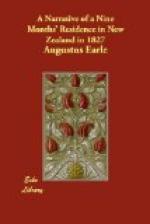Here stood Captain Duke and myself, both witnesses of a scene which many travellers have related, and their relations have invariably been treated with contempt; indeed, the veracity of those who had the temerity to relate such incredible events has been everywhere questioned. In this instance it was no warrior’s flesh to be eaten; there was no enemy’s blood to drink, in order to infuriate them. They had no revenge to gratify; no plea could they make of their passions having been roused by battle, nor the excuse that they eat their enemies to perfect their triumph. This was an action of unjustifiable cannibalism. Atoi, the chief, who had given orders for this cruel feast, had only the night before sold us four pigs for a few pounds of powder; so he had not even the excuse of want of food. After Captain Duke and myself had consulted with each other, we walked into the village, determining to charge Atoi with his brutality.
Atoi received us in his usual manner; and his handsome, open countenance could not be imagined to belong to so savage a monster as he had proved himself to be. I shuddered at beholding the unusual quantity of potatoes his slaves were preparing to eat with this infernal banquet. We talked coolly with him on the subject, for, as we could not prevent what had taken place, we were resolved to learn, if possible, the whole particulars. Atoi at first tried to make us believe he knew nothing about it, and that it was only a meal for his slaves; but we had ascertained it was for himself and his favourite companions. After various endeavours to conceal the fact, Atoi frankly owned that he was only waiting till the cooking was completed to partake of it. He added that, knowing the horror we Europeans held these feasts in, the natives were always most anxious to conceal them from us, and he was very angry that it had come to our knowledge; but, as he had acknowledged the fact, he had no objection to talk about it. He told us that human flesh required a greater number of hours to cook than any other; that if not done enough it was very tough, but when sufficiently cooked it was as tender as paper. He held in his hand a piece of paper, which he tore in illustration of his remark. He said the flesh then preparing would not be ready till next morning; but one of his sisters whispered in my ear that her brother was deceiving us, as they intended feasting at sunset.
We inquired why and how he had murdered the poor girl. He replied that running away from him to her own relations was her only crime. He then took us outside his village, and showed us the post to which she had been tied, and laughed to think how he had cheated her: “For,” said he, “I told her I only intended to give her a flogging; but I fired, and shot her through the heart!” My blood ran cold at this relation, and I looked with feelings of horror at the savage while he related it. Shall I be credited when I again affirm that he was not only a handsome young man, but mild and genteel in his demeanour? He was a man we had admitted to our table, and was a general favourite with us all; and the poor victim to his bloody cruelty was a pretty girl of about sixteen years of age!




